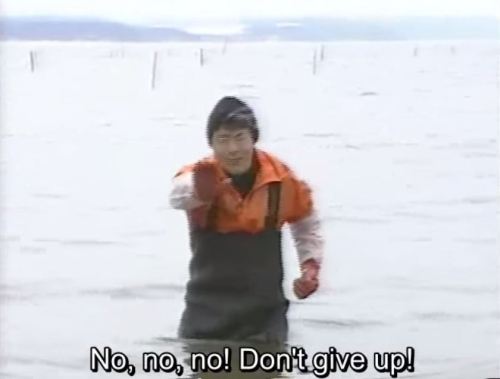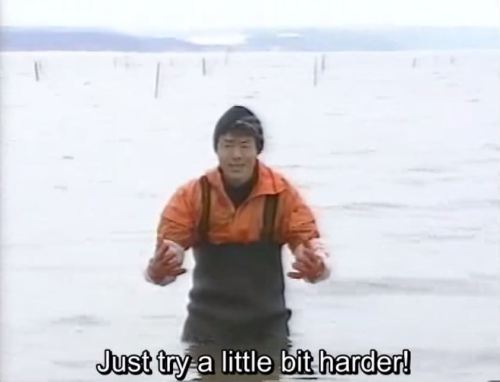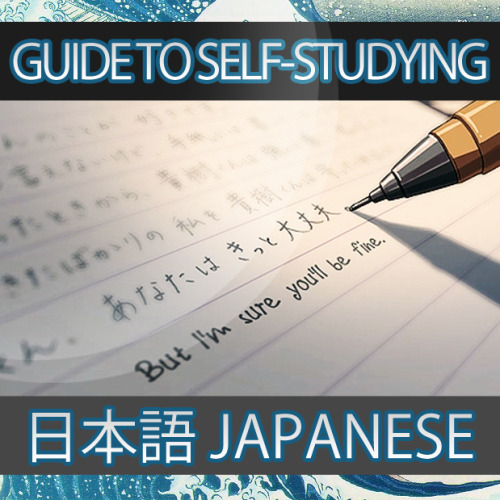こんな感じ。

こんな感じ。
More Posts from Earthquakedeer and Others

DON’T SCROLL PASS! FOUND THIS ON GOOGLE+ AND I FEEL LIKE IT IS IMPORTANT!
Edit: This post almost has 500 notes! The more people who sees this, the more help the Internet receives!

Learn JLPT N4 Vocabulary: 足音 (ashioto)

random word of the day
落ち葉 (おちば) • fallen leaves
This is maybe the most frustrating aspect of studying kanji. You start learning 山 as やま. Cool, one kanji memorized. Wait… it can also be read as さん.
Wait. All your other kanji have 2 or 4 extra readings too! Some are on'yomi. Some are kun'yomi.
Why does this have to be so complicated?!
It may seem confusing at first, but if you learn the difference between on'yomi/kun'yomi readings, where they came from, and how they work, we promise it will make learning kanji a lot easier.
Listen to this kanji-tastic episode where Kristen explains all this and more. When you’re breezing through kanji like a pro, you’ll be glad you did.

「声かけてもらえると助かる」”I’d appreciate it if you could call me.”
〜てもらえると助かる (~てもらえるとたすかる) “I’d appreciate it if you could ~/it’d be helpful if you could ~”
This grammar point is a really polite way to ask someone to do something for you.
The 〜てもらえる part is from the potential form of one of the grammar points for receiving favors 〜てもらう So basically もらう (to receive) –> もらえる (to be able to receive) 〜てくれる can be used too but 〜てもらう has a more thankful feel to it and the verb 助かる means “to be saved” or “to be helped”
Ex: 明日、空港に迎えに来てもらえると助かります。 あした、くうこうにむかえにきてもらえるとたすかります。 I’d appreciate it if you could pick me up tomorrow from the airport.







There’s this theory that in any given language, there are 600 basic words that are really, really good to know, because, you guessed it, they are the most common. Up next: a long list of determiners, including numbers (below the cut because wow, long).
this - これ
that - それ・あれ
my - 私の(わたし)
your - あなたの
his - 彼の(かれ)
her - 彼女の(かのじょ)
It’s a bit rude to use ‘his’ and ‘her’ like this (and 彼女 by itself often means ‘girlfriend’, too), so often you’d use [name]の instead for the same result.
its - Nounの
our - 私達の(わたしたち)
all - 全部(ぜんぶ)・全て(すべて)
some - 何らか(なん)
no - ありません・ない・なし
any - 何でも(なん)
many - たくさん
much - 多い(おお)
more - もっと
a few - 少ない(すく)
several - 複数(ふくすう)
whole - 全体(ぜんたい)
a little - 少し(すこ)
a lot of - 大いに(おお)
both - 両方(りょうほう)・とも
neither - も (In a negative sentence!)
each - それぞれ
every - 毎〇〇
Ex. 毎年(まいとし)=every year
other - 他の(ほか)
another - もう
same - 同じ(おなじ)
different - 違う(ちがう)
such - そういう
Keep reading
spanish expressions of the day:
“[name of a place] está donde Cristo perdió el mechero.” “[name of a place] está donde Cristo dio las tres voces.” “[name of a place] está donde Cristo perdió los clavos.” “[name of a place] está donde Cristo perdió las sandalias.”
Translation and examples:
El Ikea está donde Cristo perdió el mechero - The Ikea is where Christ lost his lighter.
El colegio está donde Cristo dio las tres voces - The school is where Christ screamed thrice (but + literally: where Christ gave the three voices.)
El museo está donde Cristo perdió los clavos - The museum is where Christ lost the nails.
Tu casa está donde Cristo perdió las sandalias - Your house is where Christ lost the sandals.
And all these Christ-y expressions mean ‘in a remote place.’

Guide to Self-Studying Japanese
A large proportion of Japanese learners self-study. Finding places to learn Japanese in a classroom environment can be difficult and expensive. Here’s a guide on how you can learn Japanese for free and from the comfort of your sofa.

When learning Japanese, the most important step is to learn Hiragana and Katakana, the writing alphabets of Japanese.
The best way I’ve found to do that is to make flashcards. Make sure you practice writing as well as recognizing them, this will not only be a great skill to have but will also reinforce the shapes in your mind.
Resources:
[Hiragana 42], the best guide I’ve found to learn the Hiragana (in a day!) [Hiranana and Katakana Quiz Site] [Kana Invaders Game] [Anki] An amazing program that will make sure you never forget any Kana….

The next step is to start learning vocabulary. Where can you find what to learn? Use a site like Memrise to find word lists (for example, there is a word list for all the vocabulary in starter textbooks like Genki), and use the amazing interface to learn them and keep them in your long term memory.
Resources:
[Memrise] as mentioned above to find and learn vocabulary lists. [Most Common Words List] [Anki] An amazing program that will make sure you never forget any Vocabulary….

While encountering vocabulary, you’re likely to be coming across super-complicated-looking Kanji. You can learn Kanji through Memrise as above, but there are some other websites that may be of interest.
Resources:
[Kanji Damage] A great site where you can learn Kanji through mnemonics. [WaniKani] by the same people who make TextFugu can help you learn Kanji from scratch. [Anki] An amazing program that will make sure you never forget any Kanji….

The next step is to apply that new vocabulary to grammar points and start making sentences.
If you can’t get your hands on textbooks like Genki, don’t fear! There are a lot of great online grammar resources.
Resources:
[TextFugu] a highly rated ‘online textbook’ which will guide you right from the beginning of learning Japanese. [Guide to Japanese] another online textbook with a lot of grammar points and excellent explanations.

So you probably started to learn Japanese because you have some interest in Japanese media. Time to start using it to your advantage!
Aside from the obvious watching Anime, J-dramas and films, why not try Reading Japanese News? Watching Japanese TV? Just make sure you are making these activities productive - note down new vocabulary, add them to Anki, and keep learning! It’s much easier to learn things you’re interested in.

The most important but difficult part of self-studying Japanese is getting your own compositions checked. Utilize all that grammar and vocabulary and write a short piece, it could be a diary entry or a short essay. Get it recorded for you by a native on RhinoSpike, and checked for grammar and consistencies on Lang-8.These sites also give you the chance to connect with Japanese natives, and perhaps start up some language exchanges!
For more resources, take a look at my Ultimate Resources List
Any more tips? Please submit them here!
Japanese Vocabulary : Using your phone in Japanese
[FRENCH BELOW]
This list is not complete, I will update it from time to time when I can ! Please note that I’m using a Samsung Galaxy S7 and there might be slight differences depending on the phone you have.
I will not put the terms written in katakana, as 1) you should know them 2) their meaning is usally easy to guess since most of the time they’re english words.
PS : If you’re learning French, note that there are quite a few words / expressions that are abbreviated !
PS2 : Also note that I put my phone back in English and French to get the best translations, but some words are “computer terms” so please check before using them in another context :)
I hope this will be useful :)
Cette liste n’est pas complète, je la mettrai à jour quand je pourrai! Prenez en compte le fait que j’utilise un Samsung Galaxy S7, donc il se peut qu’il y ait quelques différences avec d’autres téléphones.
Je ne mettrai pas les termes écrits en katakana : 1) vous devriez les connaître 2) si vous comprenez l’anglais leur sens est normalement simple à trouver, sinon il suffit d’aller chercher la signification (ce qui est bien plus facile que de chercher des kanjis qu’on ne connait pas…)
PS : J’ai remis mon téléphone en anglais et en français pour avoir la meilleure traduction, mais faîtes attention car certains mots sont des termes réservés à l’électronique et pourraient ne pas fonctionner dans un autre contexte !
ロックを解除(かいじょ)するには、スワイプしてください : Swipe screen to unlock / Faîtes glisser votre doigt sur l’écran pour déverrouiller.
機内(きない)モード : Airplane mode / Mode hors-ligne
省電力(しょうでんりょく) : Power saving / Eco. énergie
縦画面(たてがめん) : Portrait / Portrait
自動回転(じどうかいてん) : Auto rotate / Rotation auto.
位置情報(いちじょうほう) : Location / Position
全(すべ)て消去(しょうきょ) : Clear all / Effac. tout
通知設定(つうちせってい) : Notification setting / Param. notif.
電卓 (でんたく) : Calculator / Calculatrice
翻訳 (ほんやく) Translate / Traduction
連絡先 (れんらくさき) Contacts / Contacts
時計 (とけい) Clock / Horloge
電話 (でんわ) Phone / Téléphone
予約 (よやく) Schedule (a message) / Programmer (un message)
削除 (さくじょ) Delete / Supprimer
画像 (がぞう) Pictures / Photos
検索 (けんさく) Search / Rechercher
編集(へんしゅう) Edit / Modifier
全てを朗読(ろうどく)にする Mark all as read / Tout marquer comme lu
保護(ほご)メッセージ Locked messages / Messages verrouillés
お問(と)い合(あ)わせ Contact us / Nous contacter
履歴(りれき) Recents / Récents
作成(さくせい) Compose / Rédiger
番号 (ばんごう) Number / Numéro
入力 (にゅうりょく) Enter (a text) / Rédiger
共有 (きゅうゆう) Share / Partager
追加 (ついか) Add / Ajouter
非表示 (ひひょうじ) Hide / Masquer
貼(は)り付(つ)け Paste / Coller
作 (さく) Notes / Notes (Tumblr, Instagram…)
保存 (ほぞん) Save / Enregistrer
-
 dtkfan101 liked this · 3 weeks ago
dtkfan101 liked this · 3 weeks ago -
 tuxedokit liked this · 3 weeks ago
tuxedokit liked this · 3 weeks ago -
 folded-compositions liked this · 3 weeks ago
folded-compositions liked this · 3 weeks ago -
 the-rats-have-unionized liked this · 3 weeks ago
the-rats-have-unionized liked this · 3 weeks ago -
 thevampireconnoisseur reblogged this · 3 weeks ago
thevampireconnoisseur reblogged this · 3 weeks ago -
 thevampireconnoisseur liked this · 3 weeks ago
thevampireconnoisseur liked this · 3 weeks ago -
 theblossomingthoughtproject liked this · 2 years ago
theblossomingthoughtproject liked this · 2 years ago -
 happyweekender liked this · 2 years ago
happyweekender liked this · 2 years ago -
 lilliput-army reblogged this · 2 years ago
lilliput-army reblogged this · 2 years ago -
 lilliput-army liked this · 2 years ago
lilliput-army liked this · 2 years ago -
 erkais liked this · 2 years ago
erkais liked this · 2 years ago -
 metaphysicat reblogged this · 2 years ago
metaphysicat reblogged this · 2 years ago -
 travalinguaa liked this · 3 years ago
travalinguaa liked this · 3 years ago -
 rina-inab liked this · 3 years ago
rina-inab liked this · 3 years ago -
 jameskdrakestuffs liked this · 3 years ago
jameskdrakestuffs liked this · 3 years ago -
 japaneseandokinawaresourcelist reblogged this · 4 years ago
japaneseandokinawaresourcelist reblogged this · 4 years ago -
 littleprincesslearning reblogged this · 4 years ago
littleprincesslearning reblogged this · 4 years ago -
 coco-katsu23 liked this · 4 years ago
coco-katsu23 liked this · 4 years ago -
 dead-local-heathen liked this · 4 years ago
dead-local-heathen liked this · 4 years ago -
 thaimilqt liked this · 4 years ago
thaimilqt liked this · 4 years ago -
 matcha-s reblogged this · 5 years ago
matcha-s reblogged this · 5 years ago -
 forestbeast liked this · 5 years ago
forestbeast liked this · 5 years ago -
 oh7ayati liked this · 5 years ago
oh7ayati liked this · 5 years ago -
 kindalocalanarchist liked this · 5 years ago
kindalocalanarchist liked this · 5 years ago -
 babyboo915-blog1 liked this · 5 years ago
babyboo915-blog1 liked this · 5 years ago -
 peaceplanetjournal-blog liked this · 5 years ago
peaceplanetjournal-blog liked this · 5 years ago -
 peaceplanetjournal-blog reblogged this · 5 years ago
peaceplanetjournal-blog reblogged this · 5 years ago -
 l0velybugg0 liked this · 5 years ago
l0velybugg0 liked this · 5 years ago -
 white--wizard reblogged this · 5 years ago
white--wizard reblogged this · 5 years ago -
 white--wizard liked this · 5 years ago
white--wizard liked this · 5 years ago
Just a person learning Japanese. Self-learner. If you're also studying Japanese and want to practice with someone (and you're also very much a beginner) then message me! はじめまして! さびーなです。よとしく!
196 posts